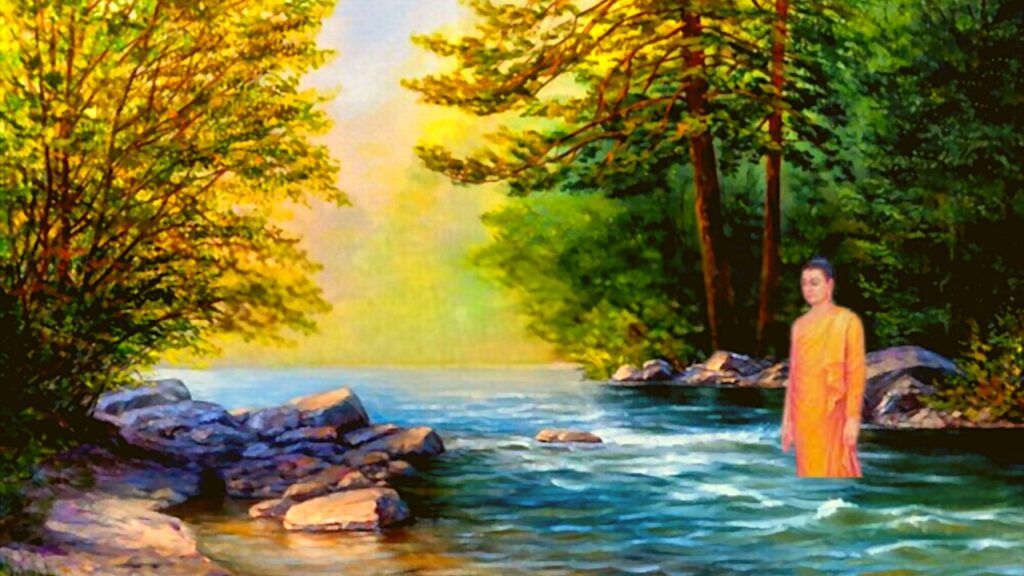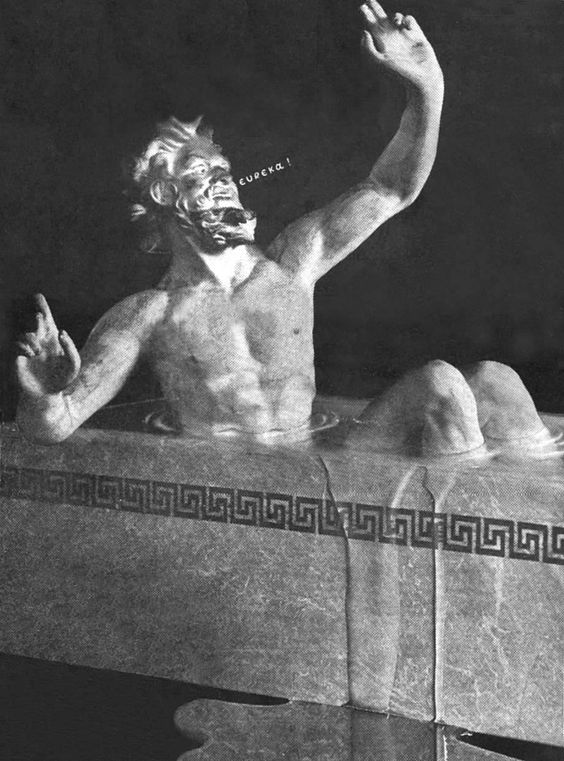ACCOMPLISH DO NOTHING. ATTEND TO NO AFFAIRS. TASTE THE FLAVOURLESS.
In action, do nothing– this is the very deepest secret of Lao Tzu. He says when things can be done by non-doing, why do you bother to do? When things can be done by non-doing, if you do, if you try to do, you will create only troubles for yourself.
Let me give you a few examples. You must have heard the name of Archimedes; his story is famous.
He was trying to solve a scientific problem. He tried hard, tried his best, couldn’t sleep, couldn’t do anything else. The king had given him a problem to be solved and it had to be solved immediately. And he was the first man to tackle that problem, so there was no precedent, no history, nothing in the past which could be of any help. The problem had never before been raised, that was the first time.
He worked hard, became tense, as tense as one can be. Then what can you do? If you cannot solve you cannot solve! One feels helpless, he felt the helplessness.
One day, while he was taking his bath, lying in the bathtub, relaxed – he had dropped the idea of solving the problem, it could not be solved – suddenly, it was solved! And he became so ecstatic that he forgot that he was naked in the bath, he ran into the streets crying loud, Eureka! Eureka! which means ’I have found it! I have found it!’
The king thought that he had gone mad, the whole town thought that he had gone mad. He had not gone mad, he had found the solution. And’ when the king asked, How? He said: By non-doing. I was not doing anything, I was not even trying to solve it, in fact I had dropped it. I had stopped completely all activity about it, I was relaxing.
IS IT A MATTER OF LONG CONSCIOUS EFFORT, OR OF A SUDDEN TOTAL SURRENDER TO EXISTENCE?
It is both. You have to make all effort that is possible, that you can do. No stone should be left unturned, no energies should be left unused. You must get totally involved. You are required to work as a unit, only then the flowering, the happening, will become possible. But that doesn’t mean that it is an outcome of your effort; just by your effort it is not going to happen. This is a little delicate and you will have to be very penetrating about it, then only will you understand. Effort will not lead you to enlightenment, but without effort no one has ever achieved it. This may look like a paradox. It is not, it is a simple law.
What happened then? When you relax, you become one with the whole. When you relax you are no more the ego. When you relax you are no more the individual. When you relax you become the whole. When you are tense you become individual. The more you are tense, the more you are a concentrated ego.
Ego is very small, how can it solve anything? it can fuss around, but it cannot solve anything. When the ego is not there, you are relaxing in a tub bath– suddenly the problem is solved!
It happened to Buddha.
For six years he was doing– and doing really too much; nobody has been in search of the innermost meaning of life as deeply as Gautam Buddha. For six years he did whatsoever could be done, whatsoever is humanly possible. He went to teachers, all the known teachers of those days, and the teachers became helpless because whatsoever they said, Buddha did – and did so perfectly that they couldn’t say: You are not doing enough, that’s why you are not achieving. He was doing so well, better than his own Masters, that they said: Now, forgive us, you go somewhere else. It is not happening, and we cannot help you in any way anymore. You find some other teacher. He surrendered to every master, and whatsoever was said he did so perfectly that even the master started feeling jealous. And every master finally had to say to Buddha, ”This is all I can teach. And if nothing is happening I cannot blame you, because you are doing everything so perfectly. I am helpless. You will have to move to some other teacher.”
This rarely happens because disciples never do everything so perfectly, so the master can always say, ”Because you are not doing well, that’s why nothing is happening.” But Buddha was doing so well, so absolutely well, that no master could say to him, ”You are not doing well.” So they had to accept defeat. They had to say, ”This is all we can teach, and you have done it and nothing is happening, so it is better you move to some other master. You don’t belong to me.”
Then he became fed up with all teachers, fed up with all systems, philosophies, fed up with all techniques, methods; he started doing things on his own– but then too nothing happened.
Six years passed, six years of a nightmarish existence; he lived in deepest anguish. Then one day while passing the River Niranjana near Bodh-Gaya, he had become so weak, because of a long fast – somebody had suggested that he go on a long fast, that would help– he had become so weak he couldn’t cross the river.

The River Niranjana is not a very big river, but he was really weak. He remained clinging to the roots of a tree, otherwise the current would have taken him. There, clinging to the roots of a tree, he started thinking, “what have I been doing? I have simply destroyed myself, I have reached nowhere. The world is finished, THAT I have left behind; now this moksha, salvation, God, truth, whatsoever you call it, that too is finished, I don’t care. I drop that too.” That moment he became unburdened.
When you search and seek there is a tension. That very tension becomes the barrier. When there was no search, no seeking, everything relaxed– the same happened to Buddha in the River Niranjana as had happened to Archimedes in his tub bath. He was relaxed, and when he was relaxed he felt an upsurge of energy.
Now this energy is not his, this energy is of the whole. He is no more there. You exist because of your seeking, greed, desire. When there is no greed, no desire, nothing to be attained, this moment is enough, an end unto itself – then you are not. The ego disappears.
So, he dropped all effort that evening. He sat under the tree, relaxed, with no effort, no goal, nowhere to go, nothing to be achieved, nothing worth achieving. When you are in such a state of mind, mind relaxes – no future, no desire, no goal, nowhere to go, so what to do? He simply sat, he became just like the tree. The whole night he slept, and later on Buddha said that for the first time he really slept that night – because when effort is there it continues in sleep also. For years he had not relaxed. That night he slept perfectly. For the first time really he slept without dreams– because dreams are part of desires.
In the day you dream, inside in your thinking; in daydreaming desires continue – a thousand and one desires, unfulfilled.
Dreams create some consolation for the mind: that which has not been fulfilled in the life is fulfilled in the dream. Dreams are consolations. But when you are not desiring, dreams disappear. And when dreams disappear, for the first time you sleep. For the first time you are so relaxed you disappear into the whole.
That night there was no effort. Buddha said, ”I slept for the first time in millions of lives. That was the first night that I slept.” Such a sleep becomes samadhi. And in the morning when he awoke he saw the last star disappear. He looked. His eyes for the first time must have been mirrorlike, with no content, just vacant, empty, nothing to project. He opened his eyes; fresh, as fresh as a newly born child, with no attitude, no mind to look through, no desire – what Buddha calls TRISHNA– no TRISHNA, no desire.
The last star was disappearing, and Buddha said, ”With that disappearing star I also disappeared. The star was disappearing and I also disappeared. And then I looked, the sky was vacant; then I looked within, there was nothing– anatta, no self, there was no one.” – because the ego can exist only with effort. If you make some effort ego is fed – you are doing something, you are reaching somewhere, you are achieving something. When there is no effort how can you exist?
He slept well; for the first time he really slept. Early in the morning, when the last star was going to disappear
That moment was eternity, because when you desire you are always moving into the future. That moment was eternity, no movement in the future, that moment was all. At that time Buddha became like a flower. A flower flowers here and now. A bird sings here and now. A man thinks always somewhere else, goes moving in the mind somewhere else. A man is never where he is. You can find him anywhere else, but you cannot find him where he is. Never!
Buddha that time was really in THAT moment – under the Bodhi tree. Physically he was there, mentally he was there, spiritually he was there, that’s why that tree became the tree of enlightenment.
Not a single thought, not a ripple in the lake of his consciousness, everything silent, no desire disturbing, no turmoil. He looked at the last disappearing star and he became enlightened. And when people used to ask later on, how did you attain? he said, “When I stopped searching, seeking. When I stopped being active – then, in deep inaction it happened. It always happens so.”
It is said Buddha laughed at the whole absurdity. There was no one who could reach. There was no one who could reach the goal, there was no one who could achieve liberation – there was no one at all, no entity. Space was without, space was within. ”And,” he said, ”at that moment of total effortlessness I achieved, I realized.”
But don’t go to relax under a tree, and don’t wait for the last star to disappear. And don’t wait thinking that with the last star disappearing you will disappear. Those six years must precede. So this is the problem: without effort no one has ever achieved, with only effort no one has ever achieved. With effort coming to a point where it becomes effortlessness, realization has always been possible.
This is what I go on emphasizing for you to do: make as much effort as you can, and don’t withhold any energy. Bring your total energy into it so you get exhausted, so the conscious mind cannot make any more effort. When the conscious cannot do anything, suddenly the unconscious reveals. And it reveals only when the conscious has become a total failure, only then it is needed– otherwise it goes on sleeping inside.
Sometimes you also may have observed – not Buddha-like, not like Archimedes – but sometimes you try to remember a name, a song, it is just on the tip of the tongue, you say, It is just on the tip of my tongue, and it is not coming; and you feel suffocated and very tense, but what can you do? If it is not coming it is not coming! The more you try, the more it seems impossible. Then you drop it!
Then you take a cigarette, and you smoke, or you go outside in the garden for a small walk; you just engage yourself somewhere else; you put on the radio, or you sip tea, or do something else and forget about it – and suddenly it POPS up, it is there.
Now two things are happening. One: you are making every effort possible, but it is not coming through the effort. Then you leave all the effort, and then it comes. Effort is needed but is not enough. If you don’t make any effort it will not come when you go to the garden or when you take a cup of tea. If you have not made total effort it is not going to come. And if you make just the effort – total even– then too it is not going to come. So total effort is needed, then total relaxation also – then it will bubble up.
A very small enlightenment, but it is of the same quality. A very very small satori, very tiny, nothing much to brag about– but of the same nature.
If you can understand the process, you have understood what Lao Tzu means by INACTION. There are things you cannot attain by action.
This is the criterion: If there is something which you can attain by action, that belongs to THIS world; anything that can be attained by action belongs to the world of matter, and anything that belongs to the world of spirit cannot be attained by action. That can be attained only through inaction, relaxation, total let go.
ACCOMPLISH DO NOTHING – accomplish total let go; – accomplish relaxation. Relax in your search for truth. When you come to seek truth, you come with the worldly mind. There ambition is needed, effort is needed, because the competition is very hard, you are not alone there: millions of people struggling, fighting with each other, a constant war goes on.
ACCOMPLISH DO NOTHING. ATTEND TO NO-AFFAIRS. Constantly attending to affairs creates anxiety. Sometimes, attend to no affairs; not doing anything.
Enjoy not doing anything. Simple – but it looks difficult. It looks difficult because of you, otherwise it is simple. Find time to do nothing. Whenever you can find some time, just close your eyes and do nothing. Soon you will have the taste of the flavourless. Soon you will enter into a different kind of existence where Jesus lives, Krishna lives, Lao Tzu lives.
Osho: Tao: The Three Treasures, Vol 3: CHAPTER 7. DIFFICULT AND EASY (excerpts)
Osho: Vedanta: Seven Steps to Samadhi: CHAPTER 9. THE MEANS IS THE END, Q 2 (excerpts)
बेपरदा सा है कुछ, लज़्ज़त भी ख़ास है,
बेचरागी में भी इक सुकून-ए-जज़्बात है
Beparda sa hai kuch, lazzat bhi khaas hai,
Becharaagi mein bhi ik sukoon-e-jasbaat hai.
There’s something unveiled, a taste beyond delight,
In the helpless surrender, a peace subtle and light.
I am loving this song from the film “Rajnigandha” (1974) written by Yogesh, sung by Mukesh and composed by Salil Chowdhury. – “Kaii baar yun bhi dekha hai…”
The line “ye jo man ki seema rekha hai, man todne lagta hai” reflects an impulse to go beyond these constraints, much like to let go of the need to “attend to no-affairs.” The desire to break free from the mind’s limits can be a step toward doing nothing: a quiet, pure moment of allowing oneself to simply be, without constant activity or worry. The song call us to observe the beauty of surrendering to the present moment—sometimes it means allowing desires to flow naturally, other times it means finding peace in the stillness and acceptance of “doing nothing.”


What Insights!!! Rajiv
You have a great gift of expression, else how could one bring forth such Depth in few sentences
Look forward to more such articles
Regards
Sekhar
Dear Rajubhai..
Many thanks for serving us such delicious dishes of spiritual journey which always exceeds than the last one. Much appreciate your hard work and insights and in depth explanations.
I do agree with DO NOTHING and realization of Bhddha and it happens when you do all efforts with ego n PARADOX.( which is our duty too) and than leave the rest on EMPTYNESS, in scientific way i think our individual mind stops working and the UNIVERSAL MIND
OR WE CAN SAY… SUPER CONSTIOUSSNESS, starts working and sugges us the true path. As Kabirji says :
MAI HU TO HARI NAHI..
HARI HAI TO MAI NAHI..
Here you are not the doer…but just the observer..and as rightly said one of the piller of spirituality ” SURRENDER” starts.
Pranams..🙏
Dear Rajeev, you well defined Patanjali Yogsutra not only Sutra II47 but whole Yogsutra.
प्रयत्न-शैथिल्यानन्त-समापत्तिभ्याम् II47
This occurs as all effort relaxes and coalescence arises, revealing that the body and the infinite universe are indivisible.
Thanks from bottom of heart. Pranam